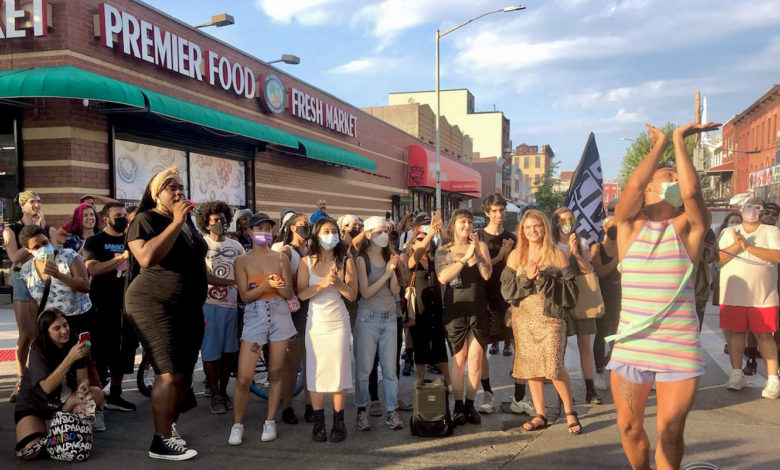
Demonstrators gathered in front of Borhan Food Market Corp in the Bushwick neighborhood of Brooklyn on Sept. 8 to protest the anti-LGBTQ attack that had occurred in the store a few days prior. Just after 2 a.m. on Sept. 4, two men assaulted Abimbola Adelaja, 36, and his 28-year-old friend with a screwdriver and liquor bottle while taunting them with homophobic slurs.
This attack follows more than a doubling of hate crimes this time last year in the New York City area. While a large percentage of this year’s hate crimes have targeted Asian and Jewish populations, the biggest jump since last year has been in sexual orientation-related hate crimes. This time last year, 14 sexual orientation-related hate crimes had been reported. Meanwhile, the count for sexual orientation-related hate crimes this year is currently at 58 — a more than quadruple jump.
Addressing the crowd, activist Gia Love called for local businesses to take responsibility for the abuse the LGBTQ community had been facing. The bodega staff offered Adelaja and his friend no help and threw them out of the store. He was left to flag down his own ambulance. Adelaja was treated for puncture wounds to his face, and his friend for lacerations on his hands and arms.
“About every week, you hear [about a violent incident]” Love said, pointing up Broadway. “I call it party row, between Myrtle-Broadway and Myrtle-Central. Where all the clubs are, someone’s getting stabbed, someone’s getting jumped.”
Some activists indicted members of the community and the NYPD for their complicity in the rise of anti-LGBTQ violence.
“Every week another trans sibling is being killed, and yet, literally, there is no noise,” proclaimed Qween Jean, an organizer for trans rights. “We know that public safety [officers] are truly public terrorists in the way that they perform, the way that they operate. There is no safety with the NYPD, and there was no safety for our community last weekend! So we are here again to truly call out for action!”
‘We are here for liberation’
Qween Jean led the chants as the demonstrators marched north towards Myrtle Ave. The crowd responded to these calls to march and fight for Black trans liberation and waved black BLM flags in solidarity, along with bright LGBTQIA+ flags.
At one point, the march stopped and formed a circle near the Kosciuszko St. subway stop. In the space that opened up, people danced to joyous clapping and drumming.
The march, at this point numbering over a hundred participants, took an eastward turn onto Myrtle Ave. and blocked the evening traffic. Cops marched alongside the crowd, trying to keep protestors from spilling over into both street lanes. Other officers, their belt loops loaded with zip ties, tailed the demonstrators.
Organizers had made the liberatory demands of the march clear early on. “We are here for liberation, we are here for freedom, and we are here to let people know you have to protect us,” Love declared. “It is your duty, and if you don’t, we will continue to march and show the community the power that we have!”





